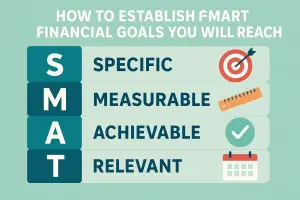It can be daunting to begin managing money, but each decade of life brings opportunities to build a stronger financial foundation. If you set clear goals and adapt to life circumstances, you can be prosperous and secure. Here's how you can decide right now to prepare confidently, with purpose, for your financial future.
Your 20s: Financial Objectives and Priorities
Your 20s are a time of discovery and growth, and it's an excellent time to begin planning for your financial future. Here's how to get started:
- Getting Credit: Building good credit early means better interest rates and more opportunities to make a profit. Consider getting a credit card, paying your bills on time, and using credit responsibly.
- Budget: Start making a budget and keeping track of your money. Use apps or spreadsheets to create a budget that matches your life and prioritizes saving money.
- Creating an Emergency Fund: Aim to put away enough money that would allow you to live for three to six months in an account that is readily accessible. This is the money that will save you from unforeseen costs or opportunities.
- Starting Out Investments: Because of the power of compound interest, a little bit of money can grow a lot over the long haul. Investigate employer-based retirement plans or set up a Roth IRA to start saving for the future.
Key Things to Consider in Your 30s
Your responsibilities may expand entering your 30s, but so do your opportunities to accomplish your financial goals:
- Increasing Income: Find ways to move up at your job or make more money in order to save and invest more. Know you can negotiate the salary you deserve and consider returning to school if it would help you earn more money.
- Putting Money into the Future: Boost retirement contributions and take a wide-ranging approach to investing. Consider bringing in a financial adviser to make sure you are getting the most out of your investments.
- Buying a House: If it's a home you seek to purchase, closely consider the housing market and the mortgage options available to you. Ensure buying a house aligns with your financial goals and well-being.
- Paying Off Debt: Pay down high-interest debt as fast as you can, but also ensure that you keep up with minimum payments on other bills. Strive to shed all of your debt before the next decade begins.
- Family Price Planning: When planning a budget for daycare, education, and family healthcare, keep in mind your long-term financial goals.
Money Tips for the 40-Something Crowd
Your 40s are about investing in yourself and investing in your future while doing what you need to in order to get ahead in life.
- Max out on Your Retirement Contributions: Be sure to take advantage of the limits on what you are allowed to contribute to your retirement account. If possible, consider some catch-up payments.
- Diversify Investments: Be sure your investing portfolio is diversified among different types of assets. Re-evaluate performance often and adjust accordingly.
- College Planning (if applicable): If you have children, pay to start or add extra money to their college funds in tax-advantaged accounts, such as 529 plans.
- Estate Planning: Establish or modify wills, trusts, and other estate planning documents to keep your wishes followed through and your assets preserved.
Money Mistakes People Make
Every decade has its issues; here are some of the common ones to avoid:
- If you're in your 20s: Not paying off debt, spending too much on things you don't need, not saving.
- In your 30s: Failing to save more when your income rises and buying too much on credit.
- Don't procrastinate when making estate-planning decisions or lump your assets.
Adjusting Your Financial Goals as Your Life Does
Be prepared for the life that you didn't plan for. Every time you get married, have kids or change jobs, you have to revise your financial plans. Just have your goals ready to evolve as necessary.
How Critical It Is to Have Achievable Goals and Monitor Your Progress Regularly
Make realistic goals that push you forward without stressing you out. You can review your goals once a year, or whenever something major happens in your life, to ensure that the goals are still crucial to you.
How to Stay Financially Disciplined
Money, you guys, it's super, super important to be disciplined. When possible, automate your savings, stop lifestyle inflation, and seek help if you're not sure how to navigate big decisions.
Motivation to Bend and Think Ahead
Remember that each step towards financial security counts. Stay motivated by celebrating little victories along the way. Rather than regarding change as a detriment, think of it as an opportunity to better oneself.
By thinking through these strategies that speak directly to each stage of life, you arm yourself with the knowing and the confidence that assists you in being successful in a financial sense over the long haul. Whether you are six or 60, it's never too late to start making the future you want.


